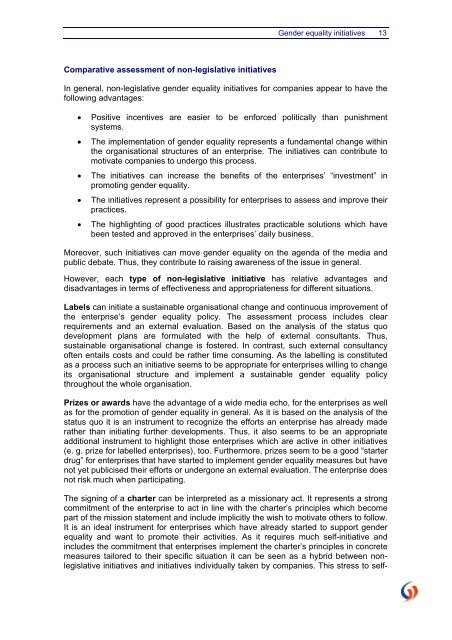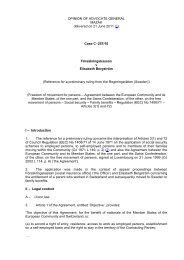Study on non-legislative initiatives for companies to promote gender ...
Study on non-legislative initiatives for companies to promote gender ...
Study on non-legislative initiatives for companies to promote gender ...
Create successful ePaper yourself
Turn your PDF publications into a flip-book with our unique Google optimized e-Paper software.
Gender equality <strong>initiatives</strong> 13<br />
Comparative assessment of n<strong>on</strong>-<strong>legislative</strong> <strong>initiatives</strong><br />
In general, n<strong>on</strong>-<strong>legislative</strong> <strong>gender</strong> equality <strong>initiatives</strong> <strong>for</strong> <strong>companies</strong> appear <strong>to</strong> have the<br />
following advantages:<br />
• Positive incentives are easier <strong>to</strong> be en<strong>for</strong>ced politically than punishment<br />
systems.<br />
• The implementati<strong>on</strong> of <strong>gender</strong> equality represents a fundamental change within<br />
the organisati<strong>on</strong>al structures of an enterprise. The <strong>initiatives</strong> can c<strong>on</strong>tribute <strong>to</strong><br />
motivate <strong>companies</strong> <strong>to</strong> undergo this process.<br />
• The <strong>initiatives</strong> can increase the benefits of the enterprises’ “investment” in<br />
promoting <strong>gender</strong> equality.<br />
• The <strong>initiatives</strong> represent a possibility <strong>for</strong> enterprises <strong>to</strong> assess and improve their<br />
practices.<br />
• The highlighting of good practices illustrates practicable soluti<strong>on</strong>s which have<br />
been tested and approved in the enterprises’ daily business.<br />
Moreover, such <strong>initiatives</strong> can move <strong>gender</strong> equality <strong>on</strong> the agenda of the media and<br />
public debate. Thus, they c<strong>on</strong>tribute <strong>to</strong> raising awareness of the issue in general.<br />
However, each type of n<strong>on</strong>-<strong>legislative</strong> initiative has relative advantages and<br />
disadvantages in terms of effectiveness and appropriateness <strong>for</strong> different situati<strong>on</strong>s.<br />
Labels can initiate a sustainable organisati<strong>on</strong>al change and c<strong>on</strong>tinuous improvement of<br />
the enterprise’s <strong>gender</strong> equality policy. The assessment process includes clear<br />
requirements and an external evaluati<strong>on</strong>. Based <strong>on</strong> the analysis of the status quo<br />
development plans are <strong>for</strong>mulated with the help of external c<strong>on</strong>sultants. Thus,<br />
sustainable organisati<strong>on</strong>al change is fostered. In c<strong>on</strong>trast, such external c<strong>on</strong>sultancy<br />
often entails costs and could be rather time c<strong>on</strong>suming. As the labelling is c<strong>on</strong>stituted<br />
as a process such an initiative seems <strong>to</strong> be appropriate <strong>for</strong> enterprises willing <strong>to</strong> change<br />
its organisati<strong>on</strong>al structure and implement a sustainable <strong>gender</strong> equality policy<br />
throughout the whole organisati<strong>on</strong>.<br />
Prizes or awards have the advantage of a wide media echo, <strong>for</strong> the enterprises as well<br />
as <strong>for</strong> the promoti<strong>on</strong> of <strong>gender</strong> equality in general. As it is based <strong>on</strong> the analysis of the<br />
status quo it is an instrument <strong>to</strong> recognize the ef<strong>for</strong>ts an enterprise has already made<br />
rather than initiating further developments. Thus, it also seems <strong>to</strong> be an appropriate<br />
additi<strong>on</strong>al instrument <strong>to</strong> highlight those enterprises which are active in other <strong>initiatives</strong><br />
(e. g. prize <strong>for</strong> labelled enterprises), <strong>to</strong>o. Furthermore, prizes seem <strong>to</strong> be a good “starter<br />
drug” <strong>for</strong> enterprises that have started <strong>to</strong> implement <strong>gender</strong> equality measures but have<br />
not yet publicised their ef<strong>for</strong>ts or underg<strong>on</strong>e an external evaluati<strong>on</strong>. The enterprise does<br />
not risk much when participating.<br />
The signing of a charter can be interpreted as a missi<strong>on</strong>ary act. It represents a str<strong>on</strong>g<br />
commitment of the enterprise <strong>to</strong> act in line with the charter’s principles which become<br />
part of the missi<strong>on</strong> statement and include implicitly the wish <strong>to</strong> motivate others <strong>to</strong> follow.<br />
It is an ideal instrument <strong>for</strong> enterprises which have already started <strong>to</strong> support <strong>gender</strong><br />
equality and want <strong>to</strong> <strong>promote</strong> their activities. As it requires much self-initiative and<br />
includes the commitment that enterprises implement the charter’s principles in c<strong>on</strong>crete<br />
measures tailored <strong>to</strong> their specific situati<strong>on</strong> it can be seen as a hybrid between n<strong>on</strong><strong>legislative</strong><br />
<strong>initiatives</strong> and <strong>initiatives</strong> individually taken by <strong>companies</strong>. This stress <strong>to</strong> self-
















